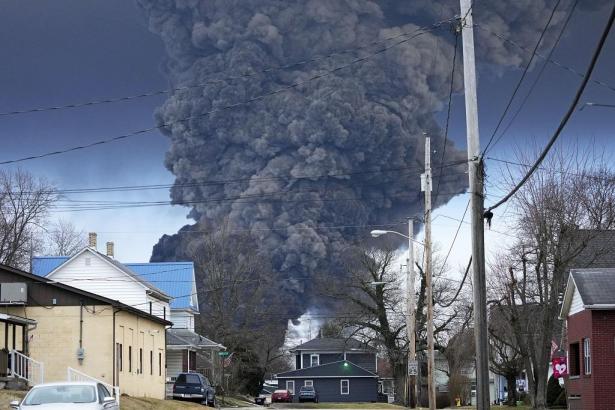
Photo: A large plume of smoke rises over East Palestine, Ohio, after a controlled detonation of a portion of a derailed Norfolk Southern freight train carrying toxic chemicals, February 6, 2023., Gene J. Puskar/AP Photo
Freight rail companies are running their trains ragged to boost profits. Sometimes they crash.
By Jarod Facundo
February 14, 2023
In the village of East Palestine, on a late Friday evening, a Norfolk Southern freight train derailed on the Ohio side of the Pennsylvania border, causing tanker cars to rupture and catch fire, releasing thousands of tons of hazardous chemical compounds into the surrounding land and atmosphere.
At the time of the crash, the known chemicals aboard included the highly toxic vinyl chloride and hydrogen chloride. An EPA document dump on February 12 revealed additional carcinogenic chemicals were aboard too, as well as some highly flammable solvents and gases. Public documents reveal that four tank cars containing vinyl chloride were stacked together.
Responding before the reveal of the cargo’s manifest, Jason Trosky, a resident of East Palestine, told the Prospect: “A $56 billion corporation knows where every one of its assets is at any given time … The reason [Norfolk Southern] didn’t show us the manifest is because the train was overloaded.”
Twenty miles earlier, grainy security footage from an equipment plant in Salem, Ohio, showed flashes of white rising from the train tracks, sparks and flames—a possible indication of fire or malfunction. Before the derailment, Michael Graham, a spokesperson for the National Transportation Safety Board (NTSB), said the crew on board was notified of mechanical failure, prompting them to activate the emergency brakes, which caused the derailment. At time of writing, it was not known whether the hotbox detector, a device used to assess the parts of a rail car, in Salem or the one in East Palestine alerted the crew on board.
Share this article on
In the following days, reporting from The Lever detailed how Norfolk Southern lobbied against transportation safety rules designed to prevent the exact sort of disaster that happened in East Palestine. They spent big to block new rules requiring rail companies to replace conventional air brakes with electronically controlled pneumatic brakes on cars carrying volatile or dangerous material. The new technology is far more effective at braking—unsurprising given that air brakes were designed in the 19th century—but the upgrades would have cost money.
Ben Ratner, a resident of East Palestine, recalled the immediate moments after the freight train derailed to the Prospect. He and his family arrived home from his daughter’s basketball game. The phones buzzed and sirens rang overhead. From the Ratner home, the train tracks are visible from the backyard. He looked outside and saw flames.
“I wasn’t fully sure what was going on for our family and friends who live over there.” So he stepped outside and walked toward the smoke and flames until he was stopped by firefighters. “I tried getting over to my friend’s house and they weren’t letting me cross the intersection,” he said, solemnly, “I was very close to their house, but they were actually getting ready to leave as well.” He then returned home.
By midnight, Ratner and his family decided they’d shelter in place. “Some people were leaving town, but our kids were getting ready for bed. We didn’t know how serious it was.” The following morning, Ratner relocated his family to his mother-in-law’s house, just over two miles away from the crash site, as he went to work for the day. His wife called him, telling Ratner that evacuation for children was mandatory, citing alleged potential charges for child endangerment. Ratner described frantically running around town, being stopped from entering East Palestine, and eventually picking up the family’s dog.
By Sunday, his family had rented an Airbnb next to the family-owned coffee shop in Salem. At the time of the interview, he said his house was on a wait list for air quality testing and he was unsure of returning. He said: “Our kids are supposed to return to school on Monday.”
Norfolk Southern lobbied against transportation safety rules designed to prevent the exact sort of disaster that happened in East Palestine.
An ominous FAQ document, with no company or government letterhead, appeared on the exterior doors of the residents of East Palestine. The document tells residents not to worry about their air quality or drinking water, and compared the inhalation of the chemicals in the air to breathing in smoke from a wood fire. Under the “Is my drinking water safe?” section, the document states:
“It is improbable that substances from the derailment will impact the groundwater or drinking water wells in the area.” Meanwhile, according to the EPA, trace amounts of the chemicals aboard the Norfolk Southern train have been identified in the Ohio River and along the creeks sprouting off the river.
Additionally, the document states that children, the elderly, and other immunocompromised people are not at risk from exposure to the substances released from the derailed train. The document states: “While smoke from any type of fire can exacerbate asthma or other breathing difficulties, no long-term effect is expected from short-term exposure.”
Continue reading East Palestine, OH: Chemical Desolation in Appalachia